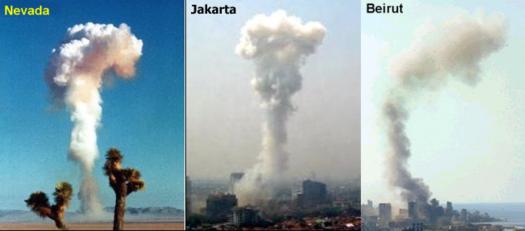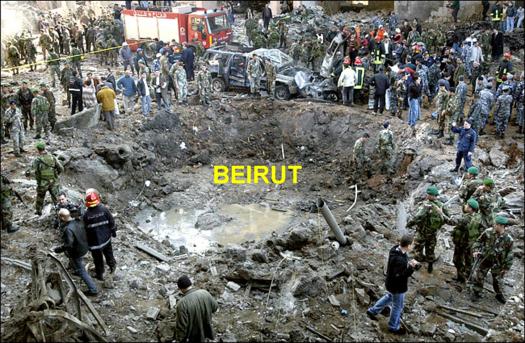


Rafiq Hariri, Lebanon's five-times prime minister and billionaire tycoon was assassinated in a huge bomb blast in Beirut last Monday, February 14. A number of others were killed or wounded in the blast that left a trail of carnage and devastation.
Mr Hariri resigned as prime minister four months ago and was expected to run as a candidate in the Lebanese elections due in May.
The assassination plunged Lebanon into turmoil and raised fears for the country's stability.
Those responsible for the assassination have not been identified but this has not stopped the United States from blaming Syria without citing any evidence.
The US has a clear agenda in Lebanon. It would like to force the withdrawal of Syrian troops which have been there since 1976, when civil war was brought to an end. It would also like to replace the present pro-Syrian government with one that is favourably disposed towards Israel and the US.
Attempting to build a case against Syria, White House spokesman Scott McClellan claimed, "Mr Hariri was a fervent supporter of Lebanese independence, and worked tirelessly to rebuild a free, independent and prosperous Lebanon following its brutal civil war and despite its continued foreign occupation."
Scott McClellan failed to mention the Israeli invasion of Lebanon and the occupation of the southern strip of Lebanese territory by pro-Israeli forces for many years.
While harping on about foreign occupation, the White House also omits mention of the occupation of Iraq and a number of other countries by the USA. Syria has only 14,000 troops in Lebanon while the US has about 150,000 occupation forces in Iraq.
Who benefits?
Short of concrete evidence, the assassination can only be analysed by considering who stands to gain from this bloody event.
When this question is asked, Syria can surely be ruled out as its leaders would know that in a climate where the US was already threatening Syria with sanctions and possible invasion, any incident which could be pinned on Syria's government would provide a ready excuse for the US to step up the
pressure. This is exactly what has happened.
Facing the same threats and pressure the governments of Iran and Syria have drawn closer together and agreed on mutual solidarity. Whether this means mutual military support in the event of a military or air attack on either of their countries by the US or Israel or both is not clear.
Iran's former President Hashemi Rafsanjani, speaking after meeting Syrian Prime Minister Mohammad Naji al-Otari, said strengthening relations between Iran, Syria, Iraq, Lebanon and other Islamic states in the region was of great importance.
Rafsanjani said that the United States and Israel were trying to create divisions among the region's countries, which must "stay completely vigilant vis-a-vis the US and Israeli plots in this regard."
Al-Otari said Israel was "the source of instability" in the Middle East.
Bogged down
Bogged down in Iraq, the US regards Syria as an easy target by which to expand its control over the Middle East. These plans are well coordinated with those of Israel. The objectives of both countries need a continuous state of instability in the region.
From within the ranks of the US administration there is strong pressure on Bush from the Christian Right and others with strong links to the right-wing Likud bloc in Israel, for the US to move into Lebanon. The killing of Hariri sets the scene for such a move.
These forces include David Wurmser, Vice President Dick Cheney's adviser on the Middle East. Wurmser played a leading role in the creation of a Pentagon intelligence unit that sought to fabricate a case for linking the Iraqi regime with al Qaida in the months leading up to the US invasion.
In 1996, Wurmser co-authored a report for incoming Israeli Prime Minister Netanyahu. Called A Clean Break: a New Strategy for Securing the Realm it advocated the repudiation of the "land for peace" formula which was the basis for peace negotiations between Israel and Palestine and the "rolling back" of Israel's regional adversaries. The plan advocated the overthrow of the Iraqi regime of Saddam Hussein and recommended Israeli strikes against "Syrian targets in Lebanon" and within Syria itself.
Douglas Feith, the current undersecretary for policy at the US Defense Department and Richard Perle, the former chairman of the Pentagon's Defense Policy Board were co-authors of the report.
In 2000, Wurmser helped draft a document entitled Ending Syria's Occupation of Lebanon: the US Role? It called for a confrontation with Syria accusing it of developing "weapons of mass destruction".
Does this sound familiar? Among those who signed the document were Feith and Perle, as well as Elliot Abrams, Bush's chief adviser on the Middle East, who was recently appointed deputy national security adviser.
Israel's interests in attacking Syria are easily seen. The Israeli rulers have not given up their intentions of thieving more and more Palestinian land and thwarting all moves towards the creation of an independent Palestinian state with East Jerusalem as its capital. This would lead to the explusion of many Jewish settlers who have occupied Palestinian land. It would create the possibility for the return of many of the Palestinian diaspora to their homeland.
The long range Israeli plans require a continual state of instability not only in their relations with the Palestinians but with neighbouring Arab states as well.
Syria has provided sanctuary to Palestinian groups that have opposed Israel, including Hamas. Israel hopes that by removing Syrian troops from Lebanon and installing a more pro-Israeli government it would be possible to force Lebanon to grant citizenship to the estimated 400,000 Palestinian refugees inside that country. Thus, one of the Palestinian demands — the right of Palestinians to return to their homeland now under Israeli occupation — will be dealt with to Israel's advantage.
So the motives leading to the assassination are clear. It should not be forgotten that Israel's intelligence agency Mossad has a long history of state-sponsored political assassinations in the region.
Since 2002, Mossad has been headed by Meir Dagan, who formerly commanded the Israeli occupation zone in Lebanon. Sharon reportedly gave Dagan a mandate to revive the traditional methods of Mossad, including assassinations abroad.
The murder of Rafiq Hariri is a brutal warning that the US war in Iraq is only the beginning of a wider campaign for US and Israeli dominance in the region.
Mustafa al-Naser a former consultant of the assassinated Rafiq Hariri said: "The assassination of Hariri is Israeli intelligence agency, Mossad's job, aimed at creating political tension in Lebanon.
"Beyond doubt, the peace, stability, and high level security prevailing in Lebanon in recent years, in creation of which all Lebanese groups play a harmonious role, is in direct contrast with Israel's political intentions for the region...", he said.
Story from The Guardian